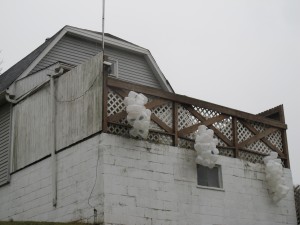AP: Some drilling states offer little information on contamination

Susan Phillips / StateImpact Pennsylvania
Empty water jugs used to haul clean water hang from a house in Washington County. Residents suspected nearby gas drilling as the culprit. The DEP investigation concluded drilling was not to blame.
A review by the Associated Press has found that people in four natural gas producing states have filed hundreds of complaints, but three of those states, including Pennsylvania, provided little information about those complaints:
The AP found that Pennsylvania received 398 complaints in 2013 alleging that oil or natural gas drilling polluted or otherwise affected private water wells, compared with 499 in 2012. The Pennsylvania complaints can include allegations of short-term diminished water flow, as well as pollution from stray gas or other substances. More than 100 cases of pollution were confirmed over the past five years.
An investigation by the Scranton Times-Tribune found that the Pennsylvania Department of Environmental Protection confirmed 161 cases of water contamination between 2008 and mid-2012. The DEP released information about its findings in 969 cases only after the newspaper took the agency to court. The Commonwealth Court criticized the DEP for its claims that producing water investigation determination letters would be “burdensome.”
Complaints are logged in an internal database that allows coordinators and inspectors in six regional offices to track their progress. It also helps DEP keep track of how many complaints deal with water supplies, for example.
“Anyone can file a complaint,” DEP spokeswoman Lisa Kasianowitz said in an e-mail. “They do not need to be a landowner.”
However, the DEP provided the AP with few details about these complaints which some researchers say creates confusion about the problems associated with drilling:
In Pennsylvania, the raw number of complaints “doesn’t tell you anything,” said Rob Jackson, a Duke University scientist who has studied gas drilling and water contamination issues. Jackson said he doesn’t think providing more details is asking for too much.
“Right or wrong, many people in the public feel like DEP is stonewalling some of these investigations,” Jackson said of the situation in Pennsylvania.
In contrast with the limited information provided by Pennsylvania, Texas officials supplied a detailed 94-page spreadsheet almost immediately, listing all types of oil and gas related complaints over much of the past two years. The Texas data include the date of the complaint, the landowner, the drilling company and a brief summary of the alleged problems. Many complaints involve other issues, such as odors or abandoned equipment.
Impact to water supplies is one of the key questions in the debate over natural gas drilling in Pennsylvania and beyond. Hydraulic fracturing or fracking involves pumping a mixture of chemicals, sand and water into a well in order to get at gas trapped in tight crack in the shale. Sometimes drilling can amplify methane migration when the gas rises to the surface through faults or water wells.
















